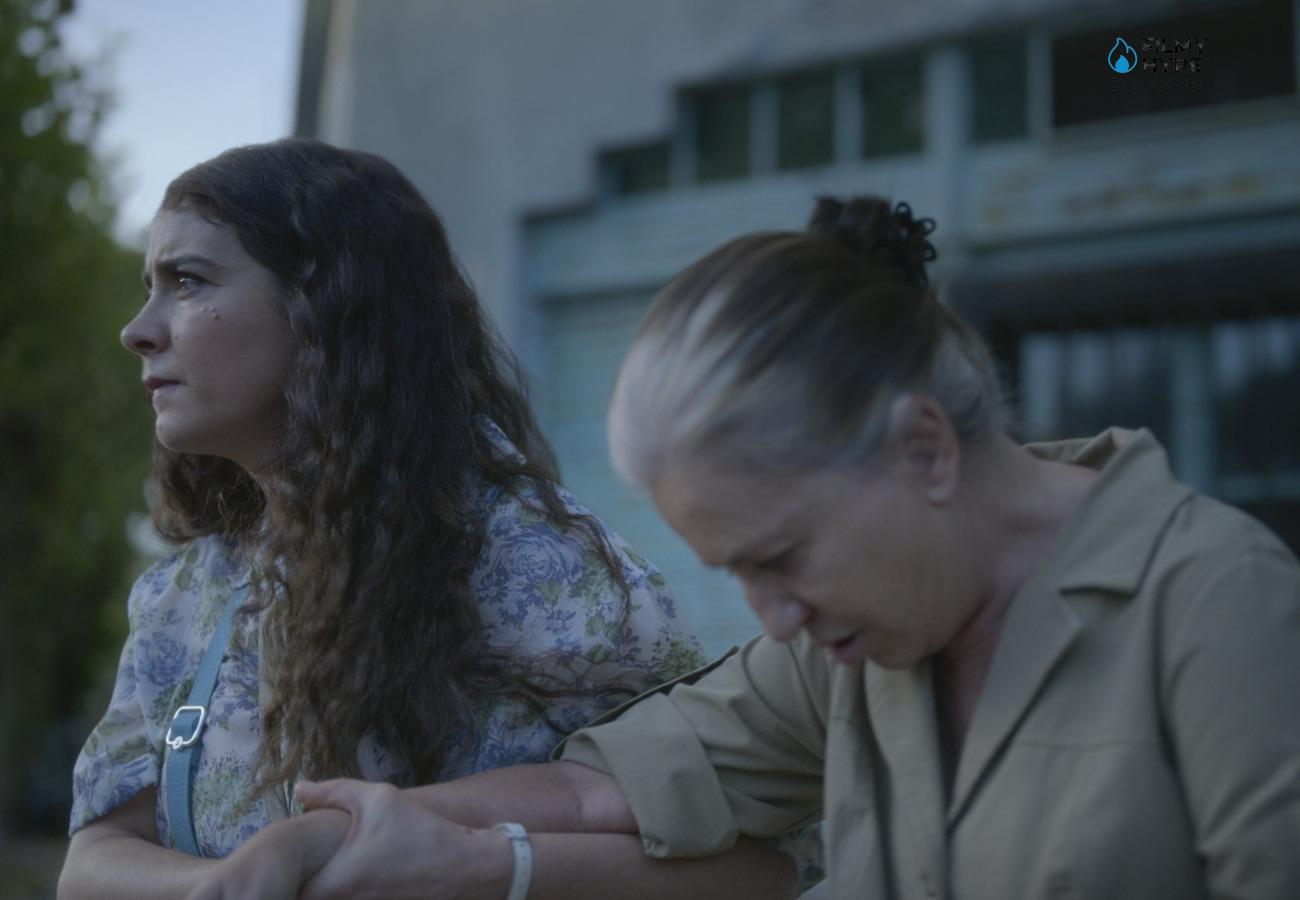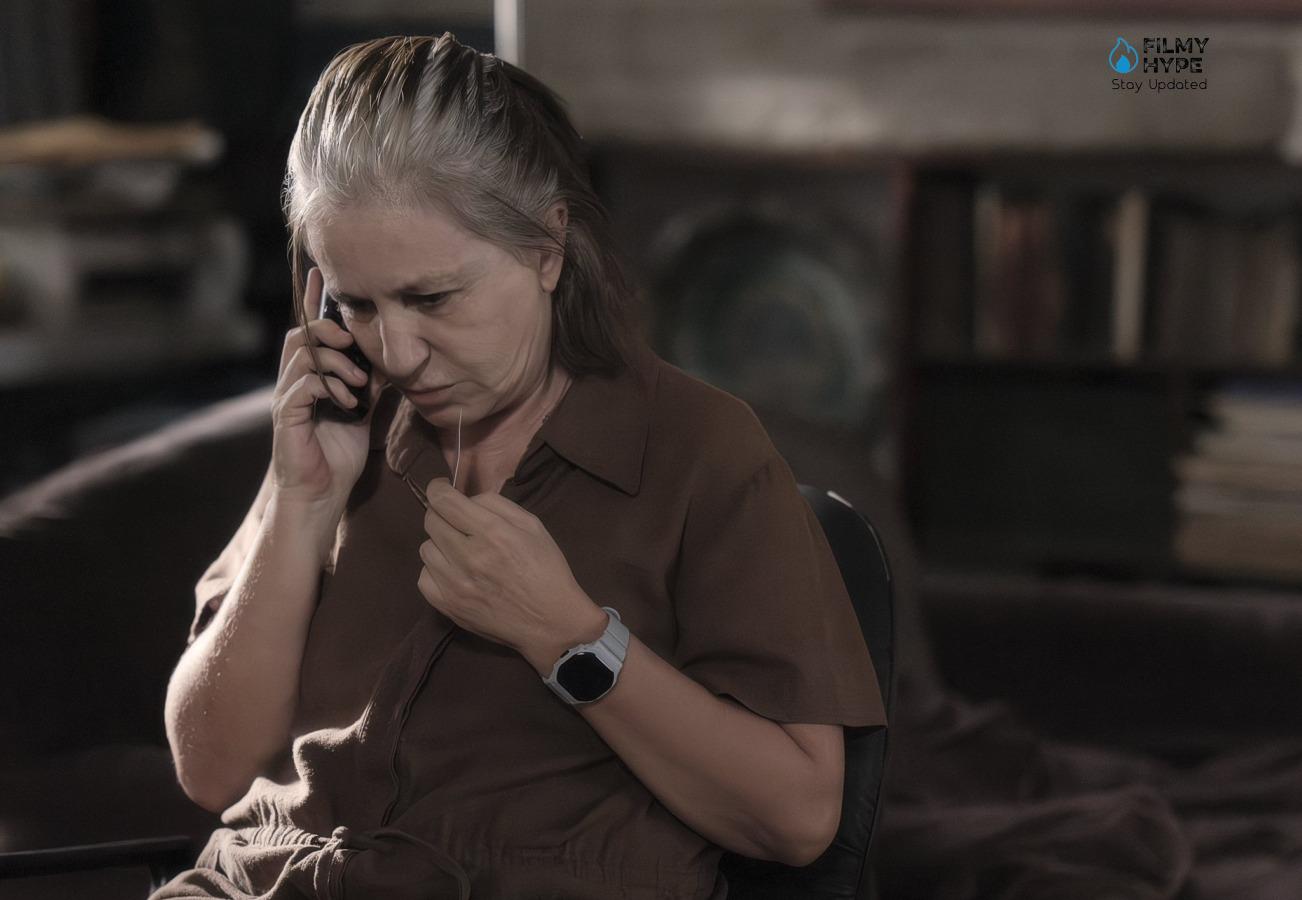Elena Knows Movie Review: Netflix Film Pushing the Viewer to Reflect and Introspect
Cast: Mercedes Morán, Érica Rivas, Miranda de la Serna
Director: Anahí Berneri
Streaming Platform: Netflix
Filmyhype.com Ratings: 3.5/5 (three and a half stars)
Elena Knows (original title Elena Sabe) is a very violent, heartbreaking, silent film, in which you have to snatch the meanings from the hands of its protagonists. Based on the bestseller of the same name by Argentine writer Claudia Piñeiro, Elena Knows is the painful story of a woman seriously ill with Parkinson’s who challenges the authorities – and her own body – to discover the truth about the disappearance of her daughter Rita, whose death was filed as suicide. A search that will lead the protagonist on a tiring journey – through the streets of Buenos Aires and her mother’s memories – of acceptance and understanding, with the sole aim of giving a face to Rita’s killer.

But, as we will see in our review of Elena Knows, the woman will face very different truths. The film directed by Anahí Berneri is indeed the story of a mother who wants to obtain justice for her daughter. Still, it is above all a journey into the disease, which shows, with harshness and clarity, what it means to be a patient suffering from Parkinson’s—pushing the viewer to reflect and introspect. This is precisely why it is so powerful. Based on the novel by Claudia Piñeiro, it is available on Netflix starting November 24, 2023, and is directed by Anahí Zulma Berner I, who wrote the screenplay together with Gabriela Larralde. The executive production is by Vanessa Ragone.
Elena Knows Movie Review: The Story Plot
Elena, an elderly woman afflicted with end-stage Parkinson’s disease, struggles with every movement of her stiff body, while her mind oscillates between reality and clear visions. She lives with her daughter Rita, a devoted teacher who dedicates herself completely to her mother’s care, sacrificing her own life to assist her at every moment. On a day like many others, Rita accompanies Elena to the hairdresser, but she never returns. She is found dead, hanging in the church tower. The police close the case as suicide, but Elena rejects this truth. Despite her debilitating illness, she transforms into a sort of detective determined to shed light on the event. Convinced that her daughter Rita was killed, perhaps by the parish priest of the church, Elena begins a desperate search to discover the truth hidden behind that tragic event.

She begins her investigation and goes in search of an old friend of her daughter’s. As she goes through her research, she goes back into the past and retraces some phases of her life as a mother. Elena is 65 years old and was once an accountant. She now has to fight against the problems caused by Parkinson’s, including physical and memory problems. The film begins with the police ringing her doorbell and letting her know that they have found the body of her daughter, Rita Alonso, who is 43 years old. The body has marks on the neck and the doctors are convinced that death occurred due to suffocation. Elena, however, cannot accept the fact that her daughter may have committed suicide, so she requests an autopsy. From here her investigations begin, where she finds herself faced with mysteries, hidden truths, and tensions. Through flashbacks, the viewer discovers the mother-daughter relationship between Elena and Rita. Additionally, other characters are also introduced.
Elena Knows Movie Review and Analysis
Elena Knows is a story of intimate introspection hidden behind the veil of a thriller. Rita’s death does not lead the film along the path of a typical investigation, but rather traces a deeply internal narrative path, transforming the film into a personal drama tinged with a psychological thriller. The heart of the story develops around Elena, an elderly woman suffering from Parkinson’s disease, forced to investigate the death of her daughter and undertake a battle against everything and everyone, but above all against herself. The police, Rita’s school environment, and the parish attended by her daughter become the battlefields for Elena, a woman convinced of a truth denied, especially by the police, who do not listen to her and do not believe her statements. The police quickly close the case, labeling it a suicide, but Elena rejects this truth and commits to investigating Rita’s murder on her own.
It is interesting to note that, throughout the entire narrative, no concrete hypotheses emerge about the alleged culprits, except for the priest. The film focuses exclusively on Elena, her pain hidden behind her burning anger and unwavering determination, as she seeks justice for her deceased daughter. Mercedes Morán gives a masterful performance as Elena, carrying, in every sense, the weight of the entire film. Her acting performance is a noteworthy work, a true artistic masterpiece. With a palpable, almost Stanislavski-like transformation, Morán completely immerses herself in the role of Elena, both physically and emotionally, allowing her character to clearly and emotionally convey states of mind to the audience. This creates a powerful empathic bond between spectators and the protagonist, also overcoming any problems with the pace, at times excessively slow, caused by long-winded and repetitive situations.

The actress’s careful work allows us to grasp every nuance, to understand the difficulty of every single movement, even the simplest in appearance, performed by Elena. These details become testimony to the strenuous struggle of a woman determined to survive despite her physical and mental challenges, to solve her most intricate enigma. This puzzle takes us not through a story of captivating crime and intrigue, but rather on an extraordinarily intimate journey, in which Elena must confront the world around her and, above all, herself. It is a process of complete re-examination of her existence which culminates in a moment of great emotional and symbolic impact, when these powerful and empathetic words are pronounced towards the sick woman: “She was a mother as best she could”, a phrase which encapsulates the very essence of the film.
Elena Knows moves between the thin border between reality and imagination, with visions imbued with a palpable nostalgia, like memories brought to life by the woman’s mind. These moments sink into the past, recalling happy moments but also less luminous ones experienced with her daughter, whose lack of affection is deeply felt by Elena. Elena’s reaction to the news of her death is surprising: she doesn’t cry, she doesn’t seem upset, but she only craves justice and truth. Throughout the film, we see her looking down, devoid of happiness or smiles, scanning the world with a harsh, judgmental gaze. She is portrayed as a mother with a difficult character, often harsh and non-empathetic, incapable of expressing genuine affection towards her daughter, depriving her of the recognition that Rita would have deserved and sought in vain.
Together with this profound characterization of the main character, the film reflects on family incommunicability and human unpreparedness in the face of unpredictable and tragic events, especially when faced with a degenerative disease. Parkinson’s not only destroys the patient’s life, erasing their authentic identity, but also torments those close to them, watching their loved one slowly degrade. This condition torments not only those affected by it but also those involved in its battle, in a vortex of pain and resistance. The disease becomes the fulcrum around which a crucial part of the narrative revolves, highlighting human fragility in the face of forces that are beyond her most intimate control. Elena is presented as a sort of irreverent and unconventional heroine, who takes no account of institutions, such as the police and the Church, and believes she knows her daughter more than anyone else, despite the numerous flashbacks showing that the relationship between the two women was anything but idyllic.
Convinced that she is the custodian of the truth – that is, of the fact that Rita did not commit suicide – Elena opposes with all her strength (what she has left) the dismissal of the case, deciding to launch a challenge, perhaps the last act of defiance given his precarious health conditions. She does this by going against all those who didn’t believe her or, worse, deliberately decided to ignore her. But also standing up to his own body, increasingly reluctant to obey her commands and capable of betraying her at any moment. Thus, from her completely unusual perspective – her Parkinson’s forces her to walk hunched over, preventing her from looking people in the face – Elena embarks on the path of discovery and understanding of herself, which will lead her to unexpected places. Although the narrative initially seems to revolve around Rita’s death, illness is the central theme of the film, always in the background – yet so cumbersome – of Elena’s continuous and solitary search for the truth.

Time, in the film directed by Anahí Berneri, is marked by the taking of medicines which grant the protagonist a few hours of respite before falling back into the abyss; an abyss made of physical pain and daily gestures that seem increasingly difficult. But also of people’s gaze, which looks pityingly at the woman but, at the same time, just want to push her away, quickly looking for something else to look at. Parkinson’s seems to scare everyone except Elena, whose only anguish is that justice will not be done for Rita. Does Elena know? It is not easy to answer this question. She thinks – or it would be better to say shows others – that she knows the truth behind Rita’s death. But what makes him believe this? First of all, the fact that she is her mother, a mother convinced that her only parental role gives her absolute knowledge of everything that concerns her daughter, from her most intimate emotions to the universe that gravitates around her.
Secondly, the awareness of living within a patriarchal society that kills women, often in the face of the inertia of the police. Finally, Elena knows that her daughter would never have wanted to die, just like her who, despite her illness continuing to take away pieces of herself, all she wants is to continue living. We don’t want to give you any spoilers on the epilogue of the story, but it’s enough to know that the film repeatedly tries to put the viewer on different paths, pushing him to reflect, introspect, and, in a certain sense, to discover for himself who or what has killed Rita. Yes, because there is a murderer, but what we don’t know is her face; at least until we find the courage to look it in the face.
Elena Knows Movie Review: The Last Words
Elena Knows unfolds as an intense and introspective drama wrapped in a thriller plot. Mercedes Morán’s masterful performance as Elena is the beating heart of the film, masterfully conveying the emotions and struggles of a complex character. The story, although it suffers at times from a slow pace and some long-winded repetitions, arises thanks to the emotional depth of the protagonist, who faces with determination the search for truth and justice for her daughter. Elena knows it is the story of a mother who wants to obtain justice for her daughter. Still, it is above all a journey into the disease, which shows, with harshness and clarity, what it means to be a patient suffering from Parkinson’s—pushing the viewer to reflect and introspect.

Elena Knows Movie Review: Netflix Film Pushing the Viewer to Reflect and Introspect - Filmyhype

Director: Anahí Berneri
Date Created: 2023-11-24 19:37
3.5
Pros
- Masterful performance by Mercedes Morán: Her performance conveys the emotional complexity and determination of the main character.
- Intimate and introspective approach: The film stands out for its focus on the protagonist's emotions and internal struggle rather than on the purely investigative aspect.
- Treatment of the theme of the disease: The representation of Parkinson's and its impact not only on the patient but also on the people close to him is touching and authentic
Cons
- Slow pace and long-winded repetitions: At some points, the film loses a bit of steam due to slow narration and some repetitive situations.
- Lack of in-depth analysis of the secondary characters: Some characters, despite valid interpretations, are poorly developed compared to the protagonist.
- Predictability in the plot: Despite the emotional complexity of the characters, the plot becomes predictable in its development at certain points.

